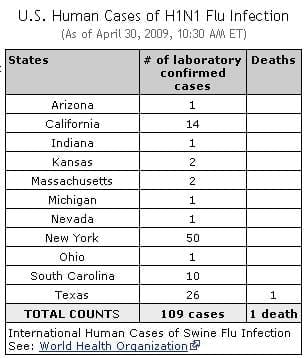 Reading Time: 5 minutes
Reading Time: 5 minutesBy now, you have probably heard that the Swine Flu is going around. In fact, just last night the Fort Worth Texas Independent School District decided to close all 140 schools in their school district for over a week. And today, my 8 year old’s elementary school principal said that one of the kids in the high school has the swine flu, which may mean that it’s in our area (Texas).
So, what does the Swine Flu have to do with Search Engine Optimization (SEO)? Let me explain a bit more. I have the opportunity to watch the website statistics of a blog post that was made just the other day about the Swine Flu. The blog post is about how you go about determining whether or not you have the Swine Flu. Certainly, it’s a pretty hot topic right now.
But, what’s even more interesting, is the website statistics and the actual search phrases (keyword phrases) that we are using to find this particular website in the search engines. I’ve taken a screen shot directly from the website statistics so you can take a look at what I mean. Click on the thumbnail of the website statistics for more information.

Do you notice something rather peculiar about these search phrases? Or maybe it’s not very peculiar at all? What I’m getting at is this: we are now in an age where our search phrases are a lot longer than before. Since when is the top search phrase to a website nine words long? Well, apparently we have now crossed into a time where I can officially say that we no longer need to target short keyword phrases with our search engine optimization efforts. Let’s take a look at some of the top search phrases that is bringing thousands of visitors to this particular website, the one with the blog post about the Swine Flu:
how do you know if you have swine flu
how do you know if you have the swine flu
how to know if you have the swine flu
how do i know if i have swine flu
how to know if you have swine flu
how to tell if you have the swine flu
how do you know you have the swine flu
how do i know if i have the swine flu
how do you know if you have swine flu?
how to tell if you have swine flu
what to do if you think you have swine flu
how do you know you have swine flu
how do i know if i have swine flu?
how can you tell if you have swine flu
swine flu dizzy
how to know if i have swine flu
what to do if you think you have the swine flu
how do you know if you got the swine flu
how can you tell if you have the swine flu
how do you know if you have the swine flu?
how to know you have swine flu
What’s interesting to me, is that you have to go down to the 15th top keyword phrase in order to get to a three keyword phrase. The top keyword phrase that brings traffic (thousands of visitors), which is 9 words long, brings 6 percent of the traffic to this website.
When you start seeing the top search phrase to a website be 9 words long, you have to start thinking of the long tail keyword phrases, keyword phrases that describe exactly what someone is searching for: those are going to be the “money keywords”, the ones that bring in very targeted visitors to your website.
During the search process, when we start searching at a search engine, we may start our searches with shorter keyword phrases. But, as we continue to search and not find what we’re looking for, we tend to broaden our search phrase, and we our search phrases becomes longer.
In this case (of the swine flu blog post), we’re seeing thousands of visitors using over 1000 different keyword phrases: and the majority of the keyword phrases tend to be longer than 5 words in length. The website is seeing thousands of pageviews every day because of these long keyword phrases.
Certainly, the blog post is informational in nature, and does not sell anything (in fact, it links over to the CDC.gov website for more information about the Swine Flu). But, this just goes to show that there really can be “lots of traffic” and lots of “targeted” traffic from people just like you and me who are now commonly using long keyword phrases to find information.
What does this have to do with Search Engine Optimization? Really, it does have a lot to do with Search Engine Optimization. When I started to see this much website traffic come from searches that were 9 keyword phrases in length, I said to myself, “Wow! I’ve never seen that before!”. I been optimizing websites since 1996, and while I have seen a lot of keyword phrases over the years, I have to admit that I have never seen so many people use so many words in a search phrase. Certainly we’re now in a unique time.
So, when looking at your website statistics, from a search engine optimization perspective, I suggest that you start looking further into the phrases that have more words in them. Don’t just look at the two or three keyword phrases. Start digging down further into the keyword phrases that actually may be easier to “rank for” because “the competition” is not targeting those keyword phrases. If you start looking at what people are “saying” in those long keyword phrases, you may be able to see what they really are looking for: and you can create content on your website around those keyword phrases that describe what they’re really looking for. And if you do that, you’re going to find a lot more conversions, a lot more sales.
Also, consider the fact that you can use your blog to answer people’s questions. For example, in this particular blog post, the author used a question as the title tag of the blog post. In fact, using some keyword research before the blog post was written, the author anticipated that people might be asking a question about this topic, the Swine Flu. So, the author of the blog post optimized the blog post so that it could potentially rank well in the search engines for a certain keyword phrase. I suggest doing the same, making sure that you are using your major “theme” of the blog post, the major keyword phrase or keywords, in the the title of the blog post. Certainly, the blog post can also mention those keywords in the blog post’s content (like in the first sentence or in the first paragraph) and elsewhere in the blog post, wherever appropriate.
At Vizion Interactive, we have the expertise, experience, and enthusiasm to get results and keep clients happy! Learn more about how our SEO Audits, Local Listing Management, Website Redesign Consulting, and B2B digital marketing services can increase sales and boost your ROI. But don’t just take our word for it, check out what our clients have to say, along with our case studies.




